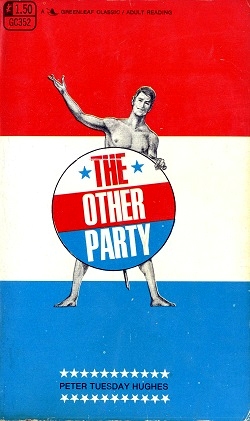
Gay 1960’s San Francisco is the best setting for any novel, and reading one actually written during that time is a particular treat. Even better when the premise is the first gay candidate for president and his drag queen lover!
The narrative has flaws for sure, but as a historical document this is an out-of-print page-turner. Published in 1968, the novel appeared amid a swirl of American political context. JFK’s assassination in 1963 is still fresh in the public’s mind, but even fresher are the murders of Malcolm X (1965), Martin Luther King Jr (1968) and Robert Kennedy (1968). More locally, California is settling into the reality of having a “movie governor” (Reagan) and San Francisco is officially a gay mecca. For the first time LGBT residents feel they have political muscle to flex.
The novel interacts with all of this. “Maybe we won’t make the White House, but we can show ‘em our power,” says gay political minds as they decide the platform for a new brand of political party. The platform is rooted in “equality for all minorities” and focuses on racial equality as well as sexual. As for names, the “Lavender Party” is first suggested before being dismissed as too campy. The “New Party” sticks and Paul Winship, a charismatic, handsome lawyer, is swept up as their candidate.
Winship’s way with words and straight appearance make him an ideal candidate to crossover into mainstream appeal. “Homosexuals must move toward a more normal presentation. This is our only chance to unite others behind our march to political power,” the operatives hypothesize.
And with this mindset Paul Winship is groomed to lead the movement. But their ideology is flawed. Discovering his own sexuality, Winship falls in love with San Francisco’s most famous drag queen, Sonny. Afraid this will destroy his relationship with the voting public, he’s told to keep Sonny a secret until after the election. Naturally Sonny is not pleased, and dire consequences follow. Perhaps being less closeted would have led to a better outcome, perhaps not. The novel lets you decide.
Outside of 1960’s political intrigue, there’s beautiful passages describing towering redwoods, fog swirling around Golden Gate bridge, and the bustle of Market Street. Understanding gay mindset in a pre-Stonewall era, when homosexuality was still considered a mental disorder, also holds historical fascination. When Winship and Sonny are wooing by the beach, Sonny has this interesting bit of dialogue: “Not here. Not on the beach. Not for the first time. That’s for queers, don’t you see?”
This kind of gay hierarchy, self-loathing, and internalized homophobia is sadly still recognizable in today’s era. The context is different, of course, but the meat of it remains the same.
Parallels between Paul Winship’s fictional 1968 candidacy and Pete Buttigieg’s actual 2020 run for the White House are a bit spooky. I’m sure Buttigieg constantly feared appearing “too gay” on camera, and calculated the intimacy of on-stage embraces with his husband to the millimeter. It’s scary to imagine what levels of homophobia would have risen to the surface if he’d been the Democratic nominee.
Now, intrigue and praise aside, there’s clear signs that this was Peter Tuesday Hughes’ first novel. He would have been a young writer—possibly 28—at the time of publication. The actual dates of his birth and death remain unconfirmed. His pacing is a bit ramshackle; his characters largely faceless and excessively plentiful. The story would serve much better as a screenplay because his vague impressions of colorful imagery and vivid characters fail to jump off the page, but might dazzle the screen.
All in all, a wonderful reading experience of a forgotten novel about important subjects. Sometimes funny, sometimes dark, but always a product of the times. A wonderful reading experience that’s about as close as you can get to time travel.
